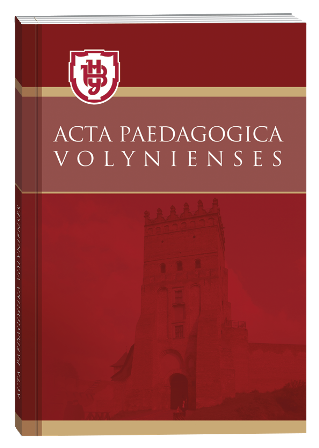LEARNING OF THE UKRAINIAN LANGUAGE BY THE PUPILS OF 5–6 GRADES IN SCHOOLS WITH THE LANGUAGES OF NATIONAL MINORITIES THROUGH THE PRISM OF MODERN APPROACHES
DOI:
https://doi.org/10.32782/apv/2023.3.4Keywords:
learning the Ukrainian language, competency-based approach, personal approach, activity approach, communicative approach, comparative approach.Abstract
The article is devoted to consideration of the specifics of learning the Ukrainian language for 5th–6th grade pupils in schools with the languages of national minorities in the context of modern scientific achievements. Attention is paid to the delineation of modern educational realities, which require the adaptation of techniques and methods of language learning to the features of social transformations, which are determined by the development of digital technologies, the preservation of a multicultural environment, etc. The article examines approaches to learning the Ukrainian language, which determine the methods, techniques, means of learning to form a holistic view of those aspects of reality that are reflected in the educational material. It is determined that the most important approaches to teaching the Ukrainian language to pupils of grades 5–6 in schools with the languages of national minorities are: competency-based approach, personal approach, activity approach, communicative approach, comparative approach. It is emphasized that these approaches effectively complement each other. The article emphasizes that the competency-based approach is aimed at a coordinated combination of theoretical knowledge and practical skills, in particular, communication skills, which prove the ability to express and perceive information, the ability to perform logical operations (analysis, comparison, justification, generalization, systematization, etc.) and the ability to demonstrate subject skills in accordance with the program material. It is emphasized that a personal approach in the process of learning the Ukrainian language manifests itself primarily in the creation of optimal conditions for the formation of the ability for a person to independently analyze certain linguistic facts, express one’s own reasoning, observations, impressions in the process of coherent speech, project the development of a given situation, using certain linguistic means, etc. The article indicates that the balanced use of different approaches (competency-based approach, personal approach, activity approach, communicative approach, comparative approach) helps to increase the effectiveness of learning the Ukrainian language.
References
Голуб Н. Б., Новосьолова В. І., Шелехова Г. Т., Ярмолюк А. В. Навчання української мови учнів 5 класу на засадах компетентнісного підходу: посібник. К. : Видавничий дім «Сам», 2017. 144 с.
Груба Т. Сучасні підходи до формування мовної особистості учнів на уроках української мови (профільний рівень). Науковий вісник МНУ імені В. О. Сухомлинського. Педагогічні науки. 2019. № 1(64). С. 65–71.
Державний стандарт базової середньої освіти, затверджений постановою Кабінету Міністрів України від 30 вересня 2020 р. № 898. Режим доступу: https://www.kmu.gov.ua/npas/pro-deyaki-pitannya-derzhavnih-standartiv -povnoyi-zagalnoyi-serednoyi-osviti-i300920-898
Кучеренко І. Технологічний аспект вивчення української мови. Дивослово. 2018. № 6. С. 9–15.
Модельна навчальна програма «Українська мова для класів з навчанням угорською мовою. 5-9 класи» для закладів загальної середньої освіти / Гнаткович Т.Д., Шумицька Г.В., Борисова Є.Е., Лукач А.Ю. К., 2021. 102 с.
Модельна навчальна програма «Українська мова для класів з навчанням румунською мовою. 5-9 класи» для закладів загальної середньої освіти / Фонарюк Т.І., Кульбабська О.В., Філіп Ю.Л., Костіна-Кніжницька А.В., Сиротюк О.М.). К., 2021. 142 с.
Модельна навчальна програма «Українська мова для класів з навчанням молдовською мовою. 5-9 класи» для закладів загальної середньої освіти / Свінтковська С. А., Верготі Л. Т., Ткаченко С. І., Цимбал Т. В. К., 2021. 94 с.
Рускуліс Л.· Когнітивно-комунікативний підхід у методичній системі формування лінгвістичної компетентності майбутніх учителів української мови і літератури. Науковий вісник МНУ імені В. О. Сухомлинського. Педагогічні науки. 2019. № 4(67). С. 182–187.
Фідкевич О. Л., Богданець-Білоскаленко Н. І. Навчально-методичний посібник «Нова українська школа»: теорія і практика формувального оцінювання у 3-4 класах закладів загальної середньої освіти для педагогічних працівників. К.: Генеза, 2020. 96 с. 10. Шелехова Г. Урахування сучасних підходів до навчання української мови учнів 8-9 класів. Українська мова і література в школі. 2015. № 2. С.2-7.







